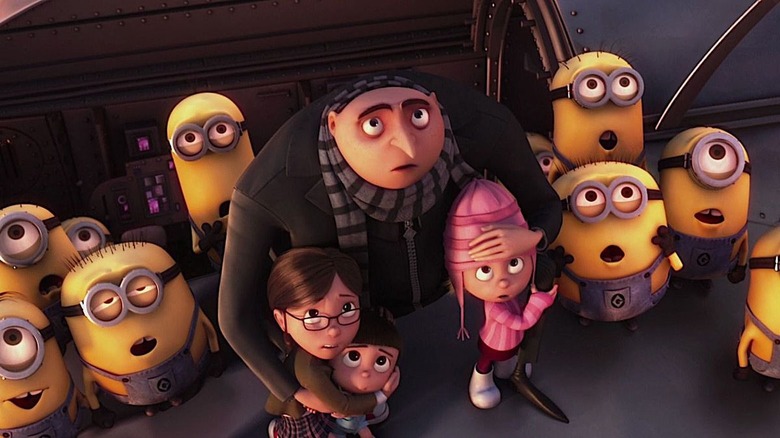
Given the enormous $7.1 billion-plus worldwide haul collected by its various features, it can be easy to forget that Illumination Entertainment didn't exist until 2010. Arriving later than even the likes of Blue Sky Studios or Sony Pictures Animation, Illumination has managed to quickly become a titan in the world of feature-length animated films aimed at families. Much of this comes from the tremendous box office grosses of the various "Despicable Me" movies. Still, the popularity of other projects like "The Secret Life of Pets" or "Sing" has also been crucial in giving this outfit its sizeable reputation.
While it's easy to ascertain that the 12 movies released by Illumination Entertainment are popular and lucrative, navigating the quality of the actual films themselves is a bit trickier. Compared to films from Pixar or Walt Disney Animation Studios, Illumination productions like "Hop" or "Minions" are often much more frivolous affairs that don't gesture towards grand instances of pathos or complex storytelling. Sometimes, this approach results in a delightful comedy. Other times, it merely creates something that never rises above being disposable. While each film varies, ranking them from worst to best reveals the finer details that have helped the outfit behind "Despicable Me" become such a successful studio.
Hop
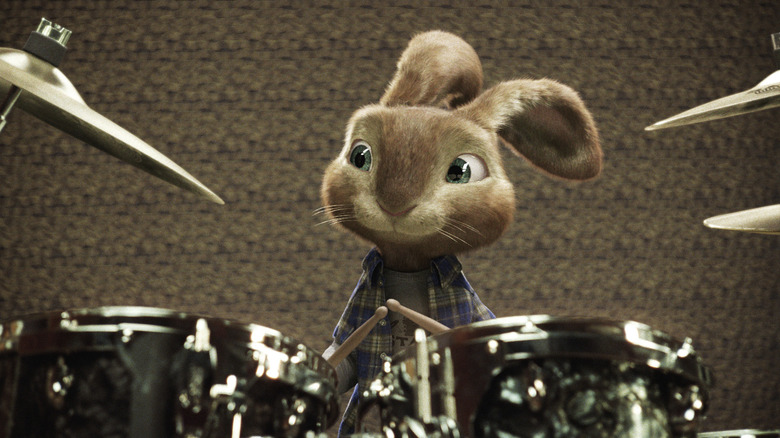
"Hop" is an anomaly in the Illumination canon. The only live-action-animated hybrid in the studio's library, "Hop" is an obvious attempt to recreate the box-office magic of 2007's "Alvin and the Chipmunks" right down to hiring that film's director, Tim Hill, to helm this modernized take on the Easter Bunny. The results are about what you'd expect, with "Hop" engaging in all the pop song needle drops, bathroom humor, and broad slapstick that have defined much of Hill's oeuvre as a filmmaker.
Rendering this as an entirely live-action affair means that this doesn't have the colorful backdrops that can sometimes liven up fully animated Illumination features. Instead, drab Los Angeles locales dominate the screen while the CG rabbit characters rarely look like they belong in such environments. However, the biggest waste of the film is the collection of actors tasked with handling this subpar material. James Marsden does his best to convey an engaging performance, but he mostly seems strained. It's a far cry from his uber-charismatic turns in other family-friendly fare like "Hairspray" or "Enchanted." While Illumination hasn't exactly moved on to thoughtful, groundbreaking cinema after "Hop," it's good that they've opted to make this Easter-themed film a weird aberration in its filmography.
The Lorax
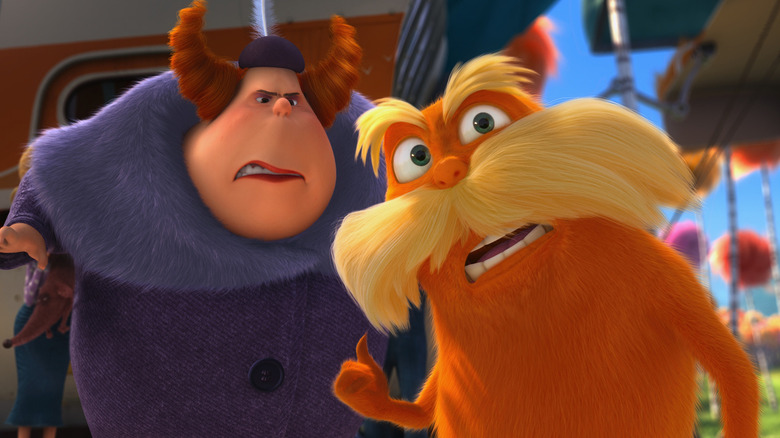
If any positive sentiment can be spared for "The Lorax," it's that getting Danny DeVito to voice the titular lead character was a stroke of genius. The gruff voice of this silver screen legend is a perfect fit for this furry defender of the trees and conveyed a sense of frustration that made it seem like the Lorax has been campaigning against ecological disasters for years now. Despite working with one of the more inspired books ever written by Dr. Seuss, the casting behind this orange creature is where the creativity begins and ends with "The Lorax." This feature otherwise goes through the expected routes in stretching a children's book into a long animated movie, including a bevy of forgettable musical numbers and an uninteresting villain who sells bottled air.
"The Lorax" reeks of having been made with marketing as the number one priority, particularly when it comes to the casting of Zac Efron. Although he was in his mid-20s when this feature was in production, Efron voices the decidedly adolescent character Ted. His deep pipes never quite fit with his character, but his presence provides another big name that marketers can slap on posters for "The Lorax." A disposable family movie, "The Lorax" is frustrating in how its shameless greed runs counter to the ethos of its source material.
Minions
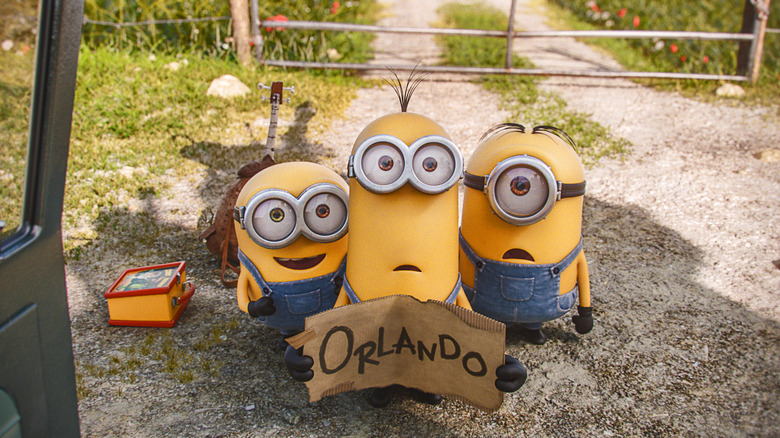
Spin-offs centered on scene-stealing side characters don't have a great track record, even when one only considers animated family movies in this subgenre. Much like how Mater couldn't anchor "Cars 2" and the titular birds of "The Penguins of Madagascar" weren't leading avian material, "Minions" sees Gru's endless string of henchmen struggling to support an entire motion picture. An amusing garnish in the original "Despicable Me" is the main course and dessert here, and the results just aren't that tasty. There's much noise and chaos in "Minions," but shockingly few laughs.
Granted, there are some bursts of amusement whenever the script indulges in its weirder side, but those blips of life are tragically sporadic. For the most part, the Minions are trapped in a formulaic narrative centered on a trio of Minions attempting to work for the nefarious villain Scarlett Overkill (Sandra Bullock). Such predictability is an incredibly restrictive space for characters who're meant to be bundles of unpredictable mayhem. Despite all the visual possibilities of setting this story in the 1960s, the animation is similarly underwhelming. Like so many other side characters mistakenly perceived to have the chops to headline a whole movie, the titular leads of "Minions" wear out their welcome long before the credits begin to roll.
The Grinch
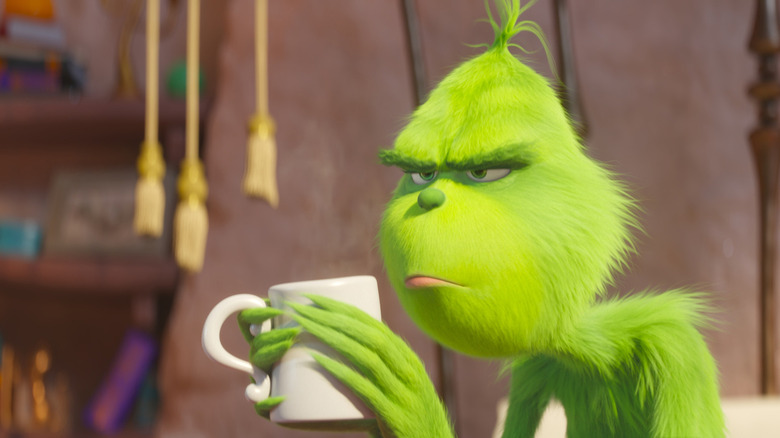
The highest compliment one can offer 2018's "The Grinch" is that it's undoubtedly an improvement on the last attempt to turn Dr. Seuss' "Grinch" into a feature film. Compared to Ron Howard's "How the Grinch Stole Christmas," "The Grinch" looks like "It's a Wonderful Life." The Whos aren't repellant, Jim Carrey's schtick doesn't overwhelm the story, and the adult humor has been dialed back. Unfortunately, being better than "How the Grinch Stole Christmas" isn't enough to make this particular movie especially good on its own merits.
"The Grinch" feels like a feature in desperate need of a jolt of energy. Despite working within the boundless visual and storytelling possibilities of animation, "The Grinch" is content to never rock the boat. Even Benedict Cumberbatch's vocal performance as the titular grouch is one of the actor's more lifeless turns and lacks any sense of enjoyable wickedness one might associate with this character. Meanwhile, the alterations to Dr. Seuss' original text, particularly a clumsy rephrasing of the book's core message in the third act, aren't even bad enough to inspire outrage from Grinch devotees over desecrated childhoods. While it's not the worst "Grinch" movie you could watch, you'd be better off reading the original children's book instead.
Despicable Me 3
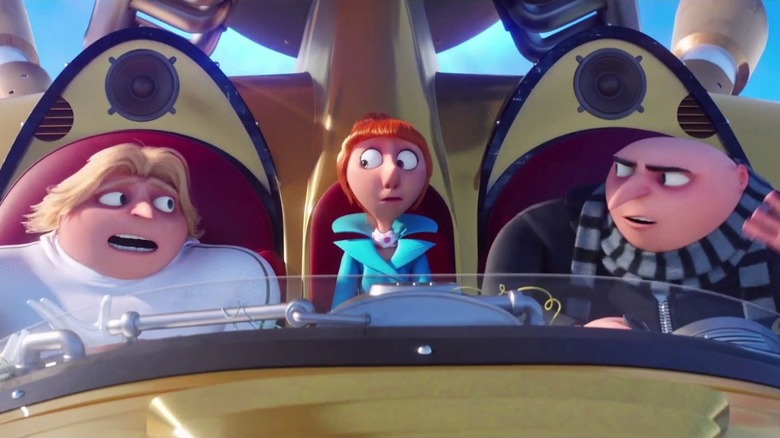
After making a detour into the past with the prequel-spin-off "Minions," the "Despicable Me" saga continued in 2017 with "Despicable Me 3." Continuing the story of Gru (voiced by Steve Carell) trying to raise a trio of precocious youngsters with help of wife Lucy (Kristen Wiig), the biggest novelty of this installment is the introduction of Gru's heretofore unknown brother Dru (also Steve Carell). The introduction of a Gru doppelganger, who also urges his sibling to get back into the supervillain game, doesn't inspire much in the way of laughs while the barrage of storylines for the protagonist's adopted offspring is similarly underwhelming in terms of comedy.
Illumination veterans Cinco Paul and Ken Daurio are responsible for the screenplay, and unfortunately, what they've cobbled together for "Despicable Me 3's" story mostly resembles a hodgepodge of pitches for potential subplots than a cohesive (or even just amusing) narrative. With this feature juggling so many disparate pieces, it can't help but feel disjointed. There are bright spots, namely the lively vocal performances of Wiig and Trey Parker, the latter playing the film's 1980s-themed antagonist. Unfortunately, "Despicable Me 3," like all the follow-ups in this franchise, can never really justify that the world of "Despicable Me" could sustain more than one movie.
The Secret Life Of Pets 2
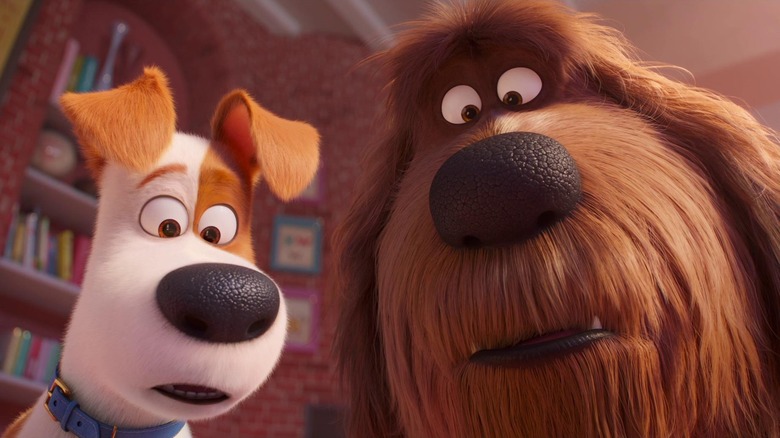
Brian Lynch's screenplay for "The Secret Life of Pets 2" takes its cues from the script for "Despicable Me 3" in seeming like several concepts for short films stitched together into one movie. Going this route leaves "Pets 2" feeling strained to sustain a feature-length runtime despite the whole production only reaching 76 minutes before the credits begin to roll. The biggest victim of the episodic narrative has to be the central conflict for Max the dog (now voiced by Patton Oswalt). His initial struggle of being an overprotective parental figure to youngster Liam eventually gives way to a more generic problem of Max always being terrified of everything. The script can't reconcile these two disjointed plot elements, and the movie suffers for it.
It's also disappointing how every character has been designed from the ground up to be as cute as possible. Whether it's a white tiger, a collection of puppies, or a wayward baby sheep, every new character has been given big eyeballs and other physical traits that would translate well to a stuffed animal. While the visuals and writing are underwhelming, at least "The Secret Life of Pets 2" does have one saving grace in the form of Harrison Ford's voice work as the experienced canine, Rooster. Ford's gruffness translates nicely to the world of voiceovers. Otherwise, this is a highly disposable sequel — even by Illumination standards.
The Secret Life Of Pets
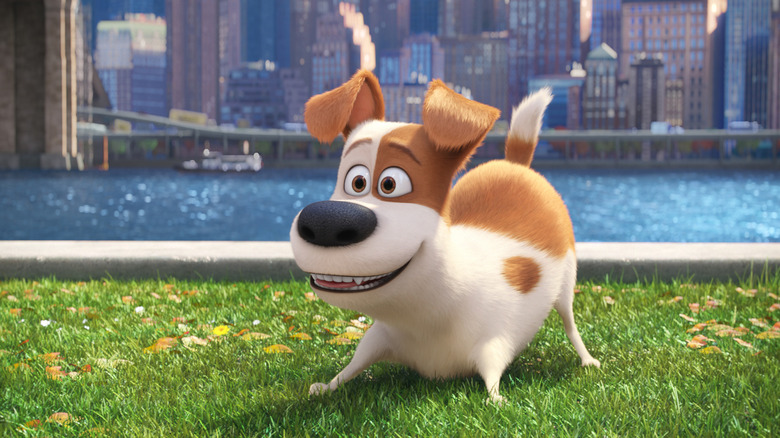
There's no denying that the general concept behind "The Secret Life of Pets" is an intriguing one. The title says it all, as this movie explores what pets (particularly a mismatched pair of canines) do when their owners aren't looking. It's an idea that's been done elsewhere in animated storytelling, but that doesn't mean "The Secret Life of Pets" doesn't do something new with the limitless possibilities of exploring what pets are like sans the people that take care of them. Unfortunately, director Chris Renaud settles for going down expected routes at every turn, particularly when it comes to gags based on the behavior of dogs you've seen a thousand times before.
Worse, the attempts at hitting big sweeping emotional moments, like a scene depicting canine Duke (Eric Stonestreet), returning to the home of his old owner, land with a thud since the script has never given us a reason to care about these critters before the tearjerker moments. In throwing so many pet-centric gags at the wall, "The Secret Life of Pets" does manage to wring some amusing jokes out of its premise, while several of the voice actors, namely Jenny Slate and Albert Brooks, manage to entertain. By and large, the creative potential of "The Secret Life of Pets" is never fully realized.
Despicable Me 2
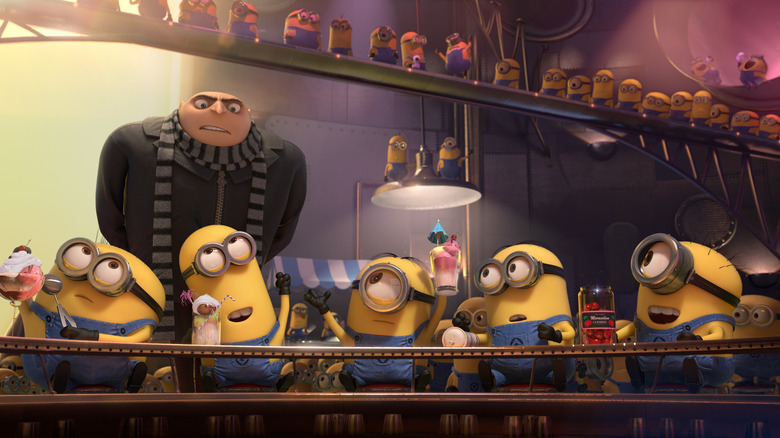
After the massive success of "Despicable Me," a sequel was inevitable. Unfortunately, everything in "Despicable Me 2" ends up being predictable. This includes whittling down the darkness in protagonist Gru, who is assigned by a secret agency to serve as a superspy and fight off other supervillains who are hiding in plain sight under secret identities. Gru just isn't as interesting without the dark comedic edge that makes him so enjoyable in the original "Despicable Me." The naughty fun of the original film is replaced with more formulaic themes, including a bog-standard romance subplot between Gru and Lucy.
The amped-up presence of the Minions also doesn't do the film any favors, and the superfluous presence of Gru's adopted daughters only makes the narrative feel even more scattershot. Thankfully, "Despicable Me 2" does feature more amusing gags than any of its successors, particularly those emanating from the lively vocal performance of Benjamin Bratt as Eduardo Pérez/El Macho. Plus, the presence of mutated and monstrous purple versions of the Minions provides some vibrant visual variety in a franchise that's often lacking in imaginative imagery. Though technically the best of the assorted "Despicable Me" sequels, "Despicable Me 2" is a disappointing endeavor that often misses why its predecessor is so beloved.
Sing 2
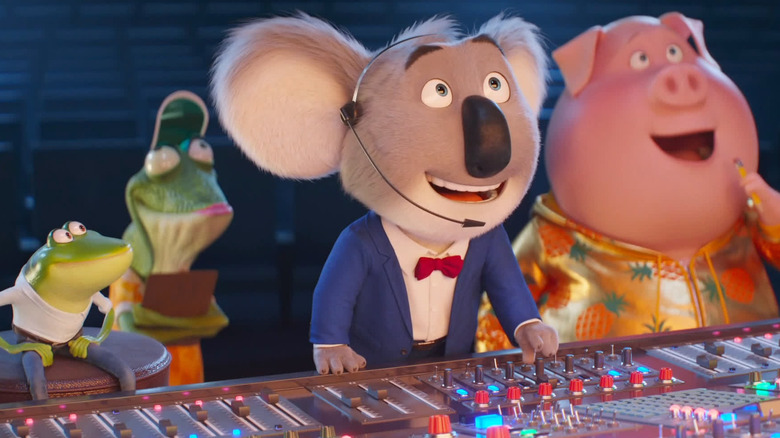
If you liked the first "Sing," there's no doubt "Sing 2" will also make your heart croon. Writer-director Garth Jennings fully adheres to the axiom "if it ain't broke, don't fix it" with his approach to this sequel. Save for shifting the action to a bigger city and ditching Seth MacFarlane's Mike the mouse character, "Sing 2" largely follows the story structure, tone, and musical stylings of its predecessor. If you're not a fan of the first "Sing," though, "Sing 2" will mostly just play like a rerun. This includes the particularly frustrating shortcoming of how randomly selected some of the various songs in the story are. "Sing 2's" use of tunes like "Bad Guy" and "Can't Feel My Face" often seem at odds with the scenes they occupy, succeeding only in cramming another recognizable pop ditty onto the soundtrack.
"Sing 2" also carries the original "Sing's" inability to reconcile its ambitions to be super moving with how its script struggles to make these animals individuals you can care about. It always knows what emotional beats it should conclude on but never how to get there organically. Unlike other Illumination titles, "Sing 2" downplays the cynicism, and there's plenty of thrilling razzle-dazzle in its biggest setpieces. Unfortunately, much like the first movie, "Sing 2" can't quite hit all the notes.
Minions: The Rise Of Gru
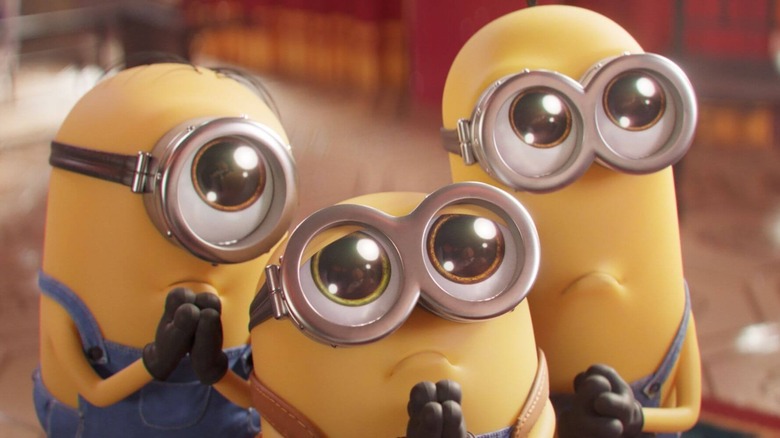
With "Minions: The Rise of Gru," the "Despicable Me" franchise gets its answer to "Ghostbusters: Afterlife" or "Star Wars: The Rise of Skywalker" in being an installment of a long-running franchise heavy on fan-service nods and callbacks to earlier entries. To boot, "The Rise of Gru" also functions as a prequel in the vein of "Solo: A Star Wars Story" that answers questions nobody was asking. If you ever wondered how Gru and Dr. Nefario (Russell Brand) met or where the Grumobile came from, this is the movie for you. For everyone else, the movie is merely a puzzling reflection of how much modern Hollywood has come to rely on acknowledging the existence of the past rather than commenting or expanding on it.
An overabundance of fan service aside, "Minions: The Rise of Gru" does end up becoming the best follow-up in the "Despicable Me" saga, mostly because of its emphasis on naughtiness. Taking place in 1976, long before Gru reformed his ways, this feature has the titular supervillain in adolescent troublemaker mode while the supporting cast is stuffed with delightful new visions of villainy such as Nun-Chuck (Lucy Lawless). The character designs and dark humor emanating from the presence of so many evildoers prove amusing more often than not, even as the antics of the Minions are largely predictable. "Minions: The Rise of Gru" is at its best focusing on new grim gags but falters when it gets preoccupied with the tired and true.
Sing
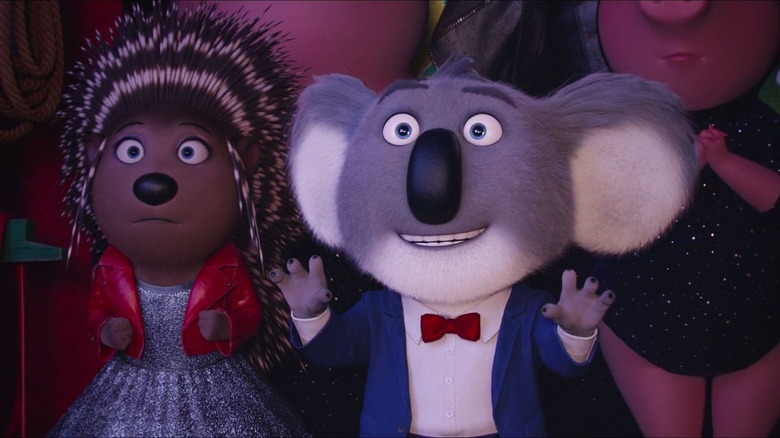
In a landscape of snarky animated kid's movies, there is something agreeable about "Sing's" old-fashioned approach as an inspirational musical. This is a backstage musical that Mickey Rooney or Fred Astaire could've anchored back in the day (if they were CGI animals, of course), with no winks to the camera or self-deprecating one-liners to make everything seem "cool." Writer-director Garth Jennings just wants to make a new entry in one of the most enduring forms of feel-good cinema. The intent is incredibly admirable, and there are individual scenes in which "Sing" manages to hit its high notes and warm the heart.
Unfortunately, too often "Sing" is dangerously beholden to tradition. The various subplots of aspiring animal singers and theater owner Buster Moon (Matthew McConaughey) are told with such rigid fidelity to standard narrative clichés that there's never enough room for real palpable emotion to enter the proceedings. "Sing" knows the music these kinds of movies dance to, but not how to inject them with unabashed vibrancy. A strange lack of proper musical numbers outside of the climax and heavy reliance on predictable pop tunes ("Hallelujah" getting dropped as the big sad song in the third act is egregiously formulaic) further weigh down what should be a toe-tapping delight. "Sing" has its charms and deserves praise for its willingness to eschew snarkiness. However, its slavish devotion to familiarity keeps it from fulfilling its full potential.
Despicable Me
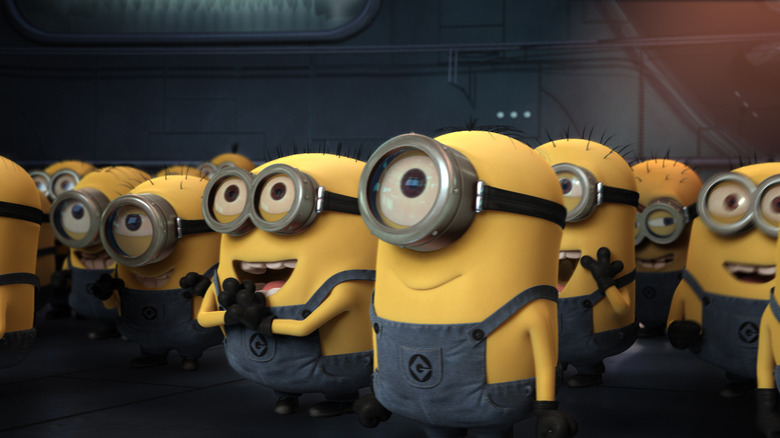
Looking back on the original "Despicable Me" after a decade of sequels and spin-offs, it's refreshing just how streamlined this initial effort was. It's also wonderful to see how this movie, the only installment that largely focuses on an "evil" version of Gru, embraces dark humor. From the beginning, when Gru threatens to kill his neighbor's dog if he keeps pooping on his lawn, there's cheeky, grim comedy that continues throughout the movie and informs the very best of "Despicable Me's" gags. Meanwhile, the storyline of Gru adopting three girls for a wicked plot and then growing attached to them doesn't break new ground, but it more often than not proves shockingly affecting. Even the Minions are much more bearable as a sporadic supporting presence. Before they were ramped up in ubiquity to satisfy the demands of moviegoers, they were good for quick visual gags.
The satisfying nature of "Despicable Me" extends to its vocal performances. A lively collection of celebrities doing exaggerated voices (Jason Segel and Julie Andrews especially excel at this task) provide plenty of laughs and nicely complement the stylized visual aesthetic of this film's world. Though the franchise it spawned has been largely disposable, "Despicable Me" still registers as an entertaining story of a bad guy going good.
Read this next: The 14 Best Animated Movies (That Aren't Made By Disney Or Pixar)
The post Every Illumination movie ranked from worst to best appeared first on /Film.
0 Comments